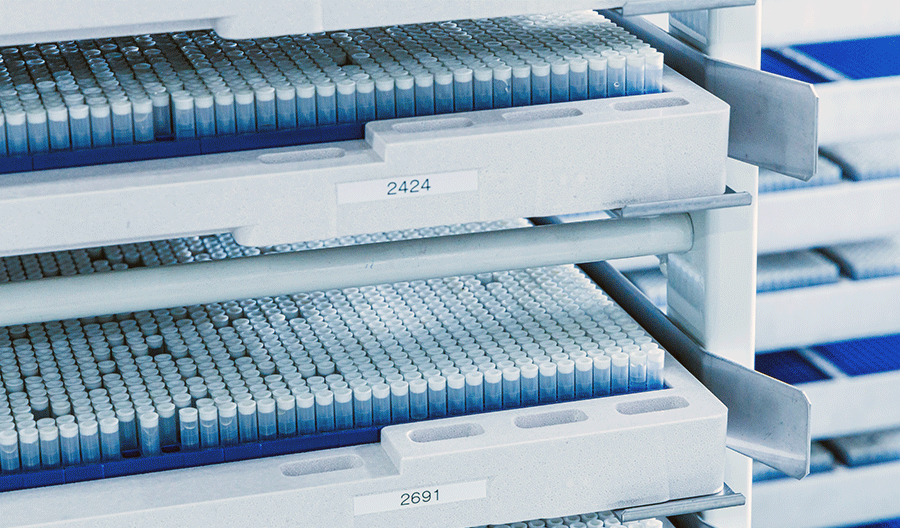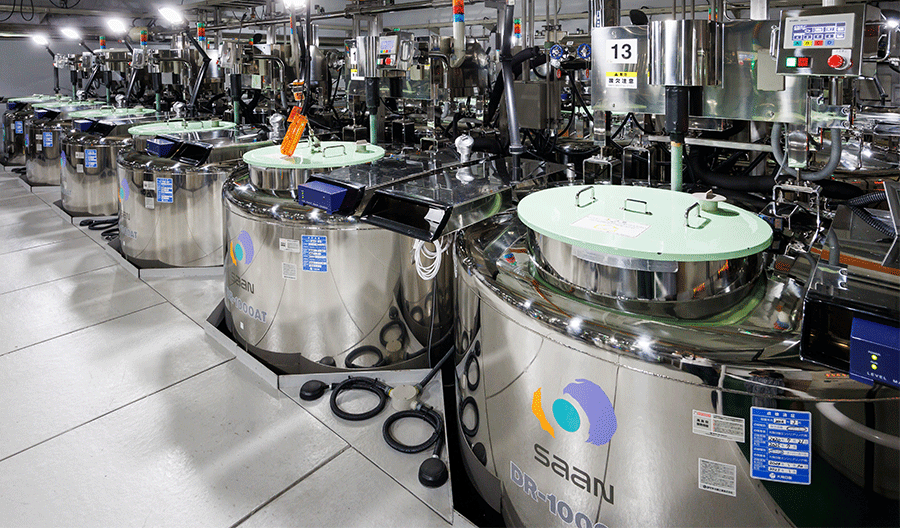

About BBJ
A biobank is a specialized depository/entity where biological samples, including blood and tissue and their relevant information/data, generously donated by patients and the public stored and managed for research purposes. These resources are supplied to studies that meet specific screening criteria, thereby contributing significantly to the advancement of medical research and the generation of valuable research outcomes.
BioBank Japan (BBJ), established in 2003 as a pioneer biobank in Japan, is a disease biobank that collects and stores biological samples and information/data from approximately 270,000 patients diagnosed with 51 target diseases. These samples and data are valuable resources for research aimed at biomarker discovery and the development of new clinical and therapeutic approaches.
Our aim is to contribute to the realization of healthy future for every one of us by promoting usage of these research resources for the advancement of genome research and genomic medicine.
Please refer to the following webpage on the BBJ’s history of the collection of samples and information to date.
The BBJ collected biological samples and clinical information from approximately 270,000 collaborating patients through cooperative medical institutions nationwide during the first three phases of 2003-2017. These samples and data are securely stored, anonymized, and assigned unique IDs for research purposes. We provide access to this invaluable resource for researchers in academia and industry working toward genomic medicine, as well as new diagnostic and therapeutic advancements.
BBJ’s samples and data are donated from patients diagnosed with 51 common diseases such as cancer, dyslipidemia, and diabetes (as of April 2025). These samples can be analyzed alongside detailed clinical information, enabling comprehensive disease research. Findings from studies using BBJ resources are published in leading journals such as Nature and widely shared across the global scientific community, driving advancements in genome research both in Japan and worldwide.
(2025.7.1現在)
Collaborative Patients
270,000 patients
51 diseases
DNA
800,000 tubes
( 270,000patients)
Serum
1,700,000 tubes
( 200,000patients)
Genome Data / Information
etc.
WGS: 16,000 patients
SNP: 270,000 patients
Clinical Information:
270,000 patients
To be expanded further!
BioBank Japan (BBJ) was established at the Institute of Medical Science, The University of Tokyo in 2003 as a national project to realize personalized medicine based on individual genetic information. The BBJ consists of the Office of BioBank Japan, the Sample Bank (DNA, Serum), as well as Genome/Clinical Information Database, and the BBJ Management Committee, which oversees the BBJ’s whole operation.

The BBJ is operated under the BBJ Management Committee, comprising Director, Head of the Office of BBJ, and Member Researchers.
Under the management of the BBJ Management Committee, there is the Office of BioBank Japan, the Sample Bank (DNA and Serum), and the Genome and Clinical Information Database. The Sample Bank holds approximately 270,000 DNA and 200,000 serum samples, as well as DNA, plasma, and tumor tissues from collaborating banking, all stored strictly according to ISO protocols. Additionally, BBJ offers contract storage services for samples from external research institutions and companies.
BioBank Japan stores biological samples, which are invaluable research resources donated by collaborating patients, in sample storages equipped with the latest security systems under strict control. Each storage unit for samples and information is equipped with a security device that permits only specific persons to enter. In addition, the operation of each storage unit is also strictly controlled with biometric authentication device. The BBJ thus constantly ensures the security of our samples and information

DNA Storage
4℃
Fully automatic system
Capacity: 2 million tubes

Serum Storage
-150°C
Liquid nitrogen tanks: 58
Capacity: 3.34 million tubes
More about the sample storage facilities
The BBJ’s Sample and Data Access Committee is an organization composed of internal and external experts. When researchers from academic research institutions or private companies who aim to realize genomic medicine or develop new diagnostic or therapeutic methods wish to use BBJ’s samples and data, their requests are reviewed by the Sample and Data Access Committee. In addition, an Advisory Board consisting of experts from external organizations and an ELSI Committee have been organized to give advice and recommendations on the BBJ based on their respective knowledge and expertise.
The BBJ has collected biological samples and data from patients who collaborated in the study with the generous cooperation of 12 medical institutions nationwide since the project’s inception in 2003.
| 12 Cooperating Medical Institutes | |
|---|---|
| The Cancer Institute Hospital of JFCR | Fukujuji Hospital |
| Iizuka Hospital | Juntendo University |
| Iwate Medical University | Nippon Medical School |
| Nihon University | Osaka Medical Center for Cancer and Cardiovascular Diseases |
| Osaka Medical Center | Shiga University of Medical Science |
| Tokushukai Hospitals | Tokyo Metropolitan Institute of Gerontology |
To promote the utilization of data obtained by the analysis of biological samples, genome data and omics data are made available in public databases such as the NBDC Human Database, the Genome Restriction Sharing Database (AGD) by DBCLS and the CANNDs. The BBJ also collaborates with the Japan Clinical Oncology Group (JCOG), the Japan Children’s Cancer Group (JCCG), and the National Hospital Organization (NHO) to store samples collected by these groups.
The BBJ are also collaborating with Institute of Science Tokyo (former Tokyo Medical and Dental University), Okayama University, and Kanazawa University and accepts their samples and data.
The BBJ collaborates with biobank-operating entities and projects in Japan, such as the Tohoku Medical Megabank Organisation (ToMMo) and the National Centre Biobank Network (NCBN)—a consortium of six national centers for highly specialized medical research (NC), to establish a framework to facilitate the use of samples and data across biobanks.
▶Biobank Cross-Bank Search System
The Biobank Cross-Bank Search System allows users to search for human-derived samples and information primarily held by Japan’s three major biobanks: BioBank Japan (BBJ), the Tohoku Medical Megabank Project (TMM), and the National Center Biobank Network (NCBN) . The system is operated by the Biobank Network Japan, which consists of 14 participating biobanks in Japan (as of April 2024), including these three major biobanks.
▶Biobank Network Japan (Japanese only)